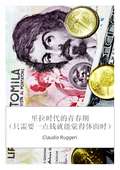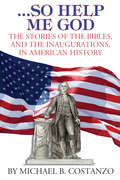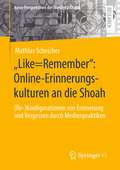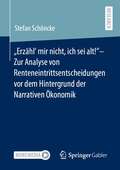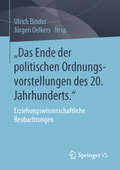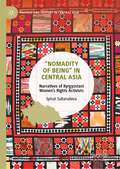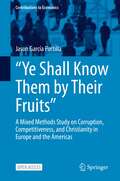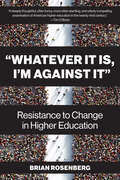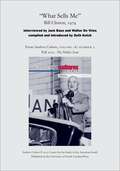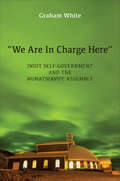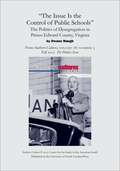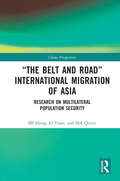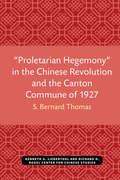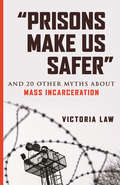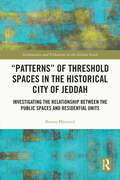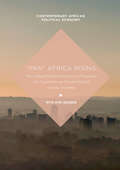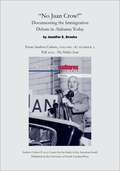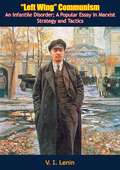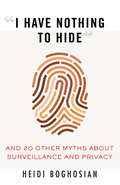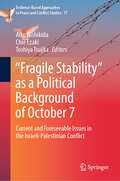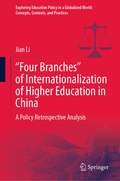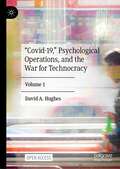- Table View
- List View
里拉时代的青春期(只需要一点钱就能觉得体面时)
by Claudio Ruggeri Ilaria Conversano我写这本书的目的并非为了仅仅从经济层面比较我们的旧货币与现在的货币之间相对的优点与缺点 而是为了停下来好好观察那个里拉成功运转但又很快被废除和遗忘的世界
リラ世代の青年期 (少ない物で王様気分になれたとき)
by Claudio Ruggeri Annalisa Di Martino夏の午後に出逢った二人の友達,若者は "リラを持っていない..." と言うフレーズをよく使っていた,今からそう遠くないが,既に存在しない時代に住んだ者の物語を聞く
…So Help Me God: The Stories of the Bibles, and the Inaugurations, in American History
by Michael B. CostanzoThe author tells the ultimate story of the use of the Bible in the United States with a brief glance back to its first use by Charlemagne in 800 then quickly moves to the beginning of constitutional government in the United States. He tells of the inaugurations beginning with George Washington in New York in 1791 when he placed his hand on a Bible loaned by a nearby Masonic lodge. Following Washington's inauguration, the author tells the story of each Bible, where it came from, how it was secured and where it is now. The story of each inauguration is also told showing the remarkable trajectory of growth in presidential celebrations and the American culture. Presidential inaugurations in other governments, on what is now U.S. soil such as the Republic of Texas, the Confederate States of America and the Republic of Hawaii, are also told. As a prelude to the stories, the author brings into focus the various editions and printings of the Bible to meet the satisfactory demands of different perspectives. It is a complete look at the use of the Book in United States Officialdom. Since George Washington used one in his 1789 inauguration, the Bible has become an indelible part of almost every American presidential inauguration. This book is a history of known Bibles used in every American presidential inauguration. It covers the United States, as well as other governments which had one time or another occupied territories now part of the United States, such as the Confederate States of America, and the Republic of Texas.
„Like=Remember“: (Re-)Konfigurationen von Erinnerung und Vergessen durch Medienpraktiken (Neue Perspektiven der Medienästhetik)
by Mathias ScheicherIn diesem Band wird systematisch und theoretisch angeleitet die alltägliche, gesellschaftliche Weitergabe von Wissen über die Shoah durch digitale Praktiken untersucht. Diese stellen die Grundlage für ein innovatives Analysemodell von Online-Erinnerungskulturen dar, das entlang populärer und medienkünstlerischer Beispiele entwickelt wird. Dabei werden Fragen nach nor-mativen Aushandlungen, Formen von Zeugenschaft sowie transnationale digitale Handlungs-routinen aus einer medienwissenschaftlichen Perspektive unter dem Begriff der (Re-)Konfigurationen neu zusammengefasst.
„Erzähl‘ mir nicht, ich sei alt!“– Zur Analyse von Renteneintrittsentscheidungen vor dem Hintergrund der Narrativen Ökonomik
by Stefan SchönckeDas vorliegende Buch beschäftigt sich mit der Frage, wie Menschen ihre Renteneintrittsentscheidung treffen. Die Narrative Ökonomik kann das ökonomische Verständnis dafür erweitern, sie ergänzt die Erkenntnisse bisheriger Modellierungen und liefert Erklärungen für bislang nicht erklärbare Phänomene. Nach differenzierten Literaturstudien zu Renteneintrittsentscheidungen und zur Narrativen Ökonomik schlägt der Autor dafür zunächst eine Definition von Narrativen und eine Konzeption ihrer Funktionen vor. Er schließt damit eine theoretische Lücke in der noch jungen Literatur der Narrativen Ökonomik. Darauf aufbauend wird eine „Theorie narrativer Renteneintrittsentscheidungen“ entwickelt und am Beispiel der Bundesrepublik Deutschland empirisch getestet. Durch eine neue Kombination von qualitativen und quantitativen Methoden werden für das Thema relevante Narrative identifiziert und darauf fußende Hypothesen mit quantitativen Zeitreihenmodellen getestet.
„Das Ende der politischen Ordnungsvorstellungen des 20. Jahrhunderts.": Erziehungswissenschaftliche Beobachtungen
by Jürgen Oelkers Ulrich BinderDer Band fasst erziehungswissenschaftliche Erkenntnisse und Positionierungen zur aktuellen historischen Phase, die mit guten Gründen als der endgültige Bruch mit soziopolitischen, -kulturellen und -moralischen Ordnungsvorstellungen des 20. Jahrhunderts bezeichnet wird, zusammen.
„Beyond the Wall”: Game of Thrones aus interdisziplinärer Perspektive
by Thomas Müller Anna GamperDieses Open-Access-Buch beleuchtet das Serienphänomen „Game of Thrones“ aus unterschiedlichen wissenschaftlichen Perspektiven: Die rechtswissenschaftliche trifft auf die sprach-, musik-, literatur- und sozialwissenschaftliche, ferner die (kunst-)historische, psychologische und theologische Perspektive. Die Beiträge zeigen auf, dass die Serie reiche Anknüpfungspunkte für die wissenschaftliche Forschung unterschiedlichster Fachrichtungen bietet, die auch dazu anregen, sprichwörtlich „beyond the wall“ zu denken. Das Buch spricht dabei sowohl ein interdisziplinäres wissenschaftliches Publikum als auch sonstige Fans der Serie an.
”Nomadity of Being” in Central Asia: Narratives of Kyrgyzstani Women’s Rights Activists (Politics and History in Central Asia)
by Syinat SultanalievaThis book offers a new framework for understanding feminism and political activiism in Kyrgyzstan, “nomadity of being. ” Here, foreign information and requirements, even forced ones, are transformed into an amalgamation of the new and the old, alien and native—like kurak, a quilted patchwork blanket, made from scraps. Conceptualizing feminist narratives in Kyrgyzstan, while keeping in mind, the complex relationship between ideological borrowing, actualization, appropriation or self-colonization of “feminist” concepts can expand both scholarly and activist understanding of specificities of post-Soviet feminisms from a historiographic point of view. Kurak-feminism is feminism that is half-donor-commissioned, half-learned through interactions (personal, media, academic, professional), unashamed of its borrowed nature and working toward its own purpose that is being developed as the blanket is being quilted. Weaving in elements from completely different and, to a Western eye, incompatible approaches nomadity of being might pave the way toward a Central Asian reframing of non-Western feminisms. This provocative text will interest scholars of European politics, the post-Soviet sphere, and feminists.
“Ye Shall Know Them by Their Fruits”: A Mixed Methods Study on Corruption, Competitiveness, and Christianity in Europe and the Americas (Contributions to Economics)
by Jason García PortillaWhy are historically Catholic countries and regions generally more corrupt and less competitive than historically Protestant ones? How has institutionalization of religion influenced the prosperity of countries in Europe and the Americas?This open access book addresses these critical questions by elucidating the hegemonic and emancipatory religious factors leading to these dissimilarities between countries. The book features up-to-date mixed methods from interdisciplinary research contributing to existing studies in the sociology of religion field by demonstrating—for the first time—the effect of the mutually reinforcing configuration of multiple prosperity triggers (religion–politics–environment). It demonstrates the differences in the institutionalization of Roman Catholicism and Protestantism by applying quantitative and qualitative methods and by performing a qualitative comparative analysis (QCA) of 65 countries. The author also provides a comprehensive survey and results of empirical research on different theories of development, focusing on the influence of religion.
“Whatever It Is, I’m Against It”: Resistance to Change in Higher Education
by Brian RosenbergAn invigorating work that identifies obstructions to transformative change in higher education and offers paths to break through. In &“Whatever It Is, I&’m Against It,&” president emeritus of Macalester College Brian Rosenberg draws on decades of higher education experience to expose the entrenched structures, practices, and cultures that inhibit meaningful postsecondary reform, even as institutions face serious challenges to their financial and educational models. A lively insider&’s account, the book pinpoints factors that hinder the ability of U.S. colleges and universities to be creative and entrepreneurial amid calls to improve affordability, access, and equity for students. Through pithy personal stories of divisive town hall meetings, multiyear college governance battles, and attempts at curricular reform, Rosenberg illustrates internal and external dynamics that impede institutional evolution. Pressures such as declining enrollment, escalating costs, and an oversupply of PhDs in academia have long signaled a grave need for reform within a profession that, as Rosenberg ruefully acknowledges, lacks organizational flexibility, depends greatly on reputation and ranking, and retains traditions, from the academic calendar to grading systems, that have remained essentially the same for decades. Rosenberg looks outside the U.S. system to find possible antidotes in innovative higher education models such as student-centered and experiential learning approaches. This thought-provoking work offers ample evidence for presidents, chancellors, deans, provosts, and faculty to consider as they plan their missions to achieve institutional transformation.
“What Sells Me”: Bill Clinton, 1974
by Walter De Vries Jack Bass Seth KotchYou can't be defensive about it. You don't apologize for it."This article appears in the Fall 2012 issue of Southern Cultures. The full issue is also available as an ebook.Southern Cultures is published quarterly (spring, summer, fall, winter) by the University of North Carolina Press. The journal is sponsored by the University of North Carolina at Chapel Hill's Center for the Study of the American South.
“We Are in Charge Here”: Inuit Self-Government and the Nunatsiavut Assembly
by Graham WhitePowerful, innovative Indigenous self-governance regimes are increasingly important players in Canadian politics, but little academic work has been done on their structure, operation, and effectiveness. "We Are In Charge Here" examines the central institution of the most populous Indigenous self-governance regime in Canada, the elected Assembly of the Nunatsiavut Government. Nunatsiavut – "our beautiful land" in Inuktitut – was established in 2006 by a modern treaty between the Labrador Inuit and the Canadian state. Graham White offers a thorough observation of the Assembly, based on interviews with Assembly members and others involved in Nunatsiavut politics, observation of Assembly sessions, and a review of official documents, in order to provide a comprehensive picture of the Assembly, its members, and its operations. The book examines the Assembly’s effectiveness in performing traditional legislative functions such as representation, policy making, and accountability. It addresses key concerns including executive-legislative power relations, Inuit influence on Assembly operations, and the Assembly’s role in realizing self-government. Illuminating the intersection of Indigenous self-governance approaches and Western institutions, "We Are In Charge Here" will be of interest to political leaders, legislative officials, and academics concerned with the design and on-the-ground functioning of Indigenous self-government.
“Trash,” Censorship, and National Identity in Early Twentieth-Century Germany
by Kara L. RitzheimerConvinced that sexual immorality and unstable gender norms were endangering national recovery after World War One, German lawmakers drafted a constitution in 1919 legalizing the censorship of movies and pulp fiction, and prioritizing social rights over individual rights. These provisions enabled legislations to adopt two national censorship laws intended to regulate the movie industry and retail trade in pulp fiction. Both laws had their ideological origins in grass-roots anti-'trash' campaigns inspired by early encounters with commercial mass culture and Germany's federalist structure. Before the war, activists characterized censorship as a form of youth protection. Afterwards, they described it as a form of social welfare. Local activists and authorities enforcing the decisions of federal censors made censorship familiar and respectable even as these laws became a lightning rod for criticism of the young republic. Nazi leaders subsequently refashioned anti-'trash' rhetoric to justify the stringent censorship regime they imposed on Germany. Examines the connections between youth protection, social welfare, and censorship in late Imperial and Weimar Germany. Locates Weimar Germany's two censorship laws in post-war anxieties about gender and the new constitution's prioritization of social rights over legal rights. Uses anti-'trash' campaigns to examine national identity in late Imperial and Weimar Germany.
“The Issue Is the Control of Public Schools”: The Politics of Desegregation in Prince Edward County, Virginia
by Dwana WaughWarren Brown recounts his hurried educational career. Unable to attend school until he was ten years old, Brown completed twelve grades in just seven years."This article appears in the Fall 2012 issue of Southern Cultures. The full issue is also available as an ebook.Southern Cultures is published quarterly (spring, summer, fall, winter) by the University of North Carolina Press. The journal is sponsored by the University of North Carolina at Chapel Hill's Center for the Study of the American South.
“The Belt and Road” International Migration of Asia: Research on Multilateral Population Security (China Perspectives)
by MI Hong LI Yuan MA QiyiniThe book studies multilateral population security issues and relevant governance strategies caused by international migration in the countries impacted by China’s Belt and Road initiative and their border areas.Buttressed by solid data mining and policy analysis, the title looks into the demographic trends of international migration in China and some Asian Belt and Road countries and stresses the urgency for more effective governance practices. Seeking to address the population security crisis triggered by the Initiative, the authors propose the idea of “multilateral population security governance”, grounded in the real-world challenges facing Belt and Road countries while also drawing on experiences of migration governance in western countries. As a new governance model, it calls for cross-border joint action and takes into consideration pertinent factors including economy, politics, culture, religion and commerce. Several case studies and comparative studies are offered in the chapters to illuminate the significance and effect of this cooperative mechanism.The book will be of interest to researchers and government officials interested in non-traditional security, international migration and formal demography as well as topics on population, resources and environment.
“Proletarian Hegemony” in the Chinese Revolution and the Canton Commune of 1927 (Michigan Monographs In Chinese Studies #23)
by S. Bernard ThomasThe Communist aim of proletarian hegemony in the Chinese revolution was given concrete expression through the Canton Commune—reflected in the policies and strategies that led to the uprising, in the makeup and program of the Soviet setup in Canton, and in the subsequent assessment of the revolt by the Comintern and the Chinese Communist Party. “Proletarian Hegemony” in the Chinese Revolution and the Canton Commune of 1927 describes these developments and, with the further ideological treatment given the Commune serving as a backdrop, will then examine the continuing evolution and ultimate transformation of the proletarian line and the concept of proletarian leadership in the post-1927 history of Chinese Communism. [3]
“Prisons Make Us Safer”: And 20 Other Myths about Mass Incarceration (Myths Made in America)
by Victoria LawAn accessible guide for activists, educators, and all who are interested in understanding how the prison system oppresses communities and harms individualsThe United States incarcerates more of its residents than any other nation. Though home to 5% of the global population, the United States has nearly 25% of the world's prisoners - a total of over 2 million people. This number continues to steadily rise - over the past 40 years, the number of people behind bars in the United States has increased by 500%.Journalist Victoria Law explains how racism was the catalyst for mass incarceration and has continued to be its driving force: from the post-Civil War laws that states passed to imprison former slaves, to the laws passed under the "War Against Drugs" campaign that disproportionately imprison Black people. She breaks down these complicated issues into four main parts:1. The rise and cause of mass incarceration2. Myths about prison3. Misconceptions about incarcerated people4. How to end mass incarceration Through carefully conducted research and interviews with incarcerated people, Law identifies the 21 key myths that propel and maintain mass incarceration, including: • The system is broken and we simply need some reforms to fix it • Incarceration is necessary to keep our society safe • Prison is an effective way to get people into drug treatment • Private prison corporations drive mass incarceration "Prisons Make Us Safer" is a necessary guide for all who are interested in learning about the cause and rise of mass incarceration and how we can dismantle it.
“Patterns” of Threshold Spaces in the Historical City of Jeddah: Investigating the Relationship Between the Public Spaces and Residential Units (Architecture and Urbanism in the Global South)
by Basma Massoud“Patterns” of Threshold Spaces in the Historical City of Jeddah explores the meaning of threshold spaces and investigates the relationship between the public spaces and residential units in the historical city of Jeddah, Saudi Arabia, while at the same time revisiting Christopher Alexander’s theory in his canonical 1977 book, A Pattern Language. This book questions and analyses “patterns” relating to the cultural, social, and environmental particularities of Jeddah, with special attention paid to the effect of gender segregation in the city’s urban configuration. It discusses the extension that has been undertaken through testing a concept from the urban design theory of the West (the United States and Canada) and applying it to an Islamic city to find patterns in four different scales, which form the basis of the investigation (body, building, street, and city). Empirical methods have been used in the context of historical Jeddah, through which patterns are investigated using different approaches for the different scales. The book aims to explore the meaning of threshold spaces in old Jeddah. Furthermore, it shows that there are eighteen patterns of threshold spaces in the old town: patterns that are solely related to this specific case study, as well as modified patterns to the ones explored by Christopher Alexander. This book shall allow not only a better understanding of the relationship between housing and the historical city but also an exploration of the role of the threshold space in shaping the old city of Jeddah. It will be of interest to researchers, students of architecture, urban planning and anthropology studies, and people involved in cultural heritage, both academics and practitioners.
“Pan” Africa Rising: The Cultural Political Economy of Nigeria’s Afri-Capitalism and South Africa’s Ubuntu Business (Contemporary African Political Economy)
by Rita Kiki EdozieThis book uses Nigeria’s Afri-capitalist and South Africa’s Ubuntu Business models as case studies that reconcile the tension between Africa Rising and Pan African economics, presenting their convergence as Africa’s viable Third Way route to global development. In presenting Afri-capitalism and Ubuntu Business as national, business sector manifestations of a “new” Pan Africanism, the author explores Africa’s “culturalist” path in engaging the international political economy. This is an African customized engagement that parallels the alternative models of China’s “market-socialism” and Latin America’s “21st C Socialism”. All present alternatives to realist, liberal, and structuralist standpoints, inclining instead toward constructivist political economies derived from the perspectives and subject conditions of African economic histories, socio-cultures, alternative modernities, and agent-led initiatives.
“No Juan Crow!”: Documenting the Immigration Debate in Alabama Today
by Jennifer E. BrooksThe bill gained quick notoriety for outdoing Arizona, Georgia, and all other states in the restrictions and penalties levied on unauthorized immigrants, as well as on the citizens, community members, employers, and health and law enforcement agencies that assist, employ, or regulate them."This article appears in the Fall 2012 issue of Southern Cultures. The full issue is also available as an ebook.Southern Cultures is published quarterly (spring, summer, fall, winter) by the University of North Carolina Press. The journal is sponsored by the University of North Carolina at Chapel Hill's Center for the Study of the American South.
“Left Wing” Communism: An Infantile Disorder; A Popular Essay in Marxist Strategy and Tactics
by V. I. Lenin"Left-Wing" Communism: An Infantile Disorder is a work by Vladimir Lenin attacking assorted critics of the Bolsheviks who claimed positions to their left. Most of these critics were proponents of ideologies later described as left communism.The book was written in 1920 and published in Russian, German, English and French later in the year. A copy was then distributed to each delegate at the 2nd World Congress of the Comintern, several of whom were mentioned by Lenin in the work.The present volume is a New Translation that was first published in the U.S. in 1940 and the UK in 1942. As with the earlier editions, the book is divided into ten chapters and contains an appendix, including a letter from David Wijnkoop on behalf of the Communist Party of Holland.
“I Have Nothing to Hide”: And 20 Other Myths About Surveillance and Privacy
by Heidi BoghosianAn accessible guide that breaks down the complex issues around mass surveillance and data privacy and explores the negative consequences it can have on individual citizens and their communities.No one is exempt from data mining: by owning a smartphone, or using social media or a credit card, we hand over private data to corporations and the government. We need to understand how surveillance and data collection operates in order to regain control over our digital freedoms—and our lives.Attorney and data privacy expert Heidi Boghosian unpacks widespread myths around the seemingly innocuous nature of surveillance, sets the record straight about what government agencies and corporations do with our personal data, and offers solutions to take back our information. &“I Have Nothing to Hide&” is both a necessary mass surveillance overview and a reference book. It addresses the misconceptions around tradeoffs between privacy and security, citizen spying, and the ability to design products with privacy protections. Boghosian breaks down misinformation surrounding 21 core myths about data privacy, including:● &“Surveillance makes the nation safer.&”● &“No one wants to spy on kids.&”● &“Police don&’t monitor social media.&”● &“Metadata doesn&’t reveal much about me.&”● &“Congress and the courts protect us from surveillance.&”● &“There&’s nothing I can do to stop surveillance.&”By dispelling myths related to surveillance, this book helps readers better understand what data is being collected, who is gathering it, how they&’re doing it, and why it matters.
“Fragile Stability” as a Political Background of October 7: Current and Foreseeable Issues in the Israeli-Palestinian Conflict (Evidence-Based Approaches to Peace and Conflict Studies #17)
by Aiko Nishikida Chie Ezaki Toshiya TsujitaThis edited book aims to offer a comprehensive analysis of the preceding and ongoing development of the Israel-Gaza war, using a multidisciplinary approach. The chapters, written by scholars of the Middle Eastern studies, political science, anthropology, and international law, investigate the root causes of the eruption of the war, taking a viewpoint from within. Hamas&’s attack on Israel on October 7, 2023 caused deep shockwaves throughout the world. While the developments seemed unprecedented, the question remains whether it was an unpredictable total surprise. Given the context surrounding Palestine and Israel, it is likely that there were inherent elements in the preceding political environment that led to the current humanitarian disaster and quagmire of the battle. The assumption is that the existence of &“fragile stability&” might have caused the October 7 attack. What kind of fragility and robustness of the framework existed in the political, social, legal, and international conditions? How did these conditions affect the conduct of the actors in this region ultimately leading to the current situation? What challenges are likely to emerge in this region in the near future? This book addresses these questions from various perspectives. For the best clarification of the questions, authors include experts in American studies who discuss the diplomatic intervention of the United States, a former judge of the International Criminal Court who explores the role of international law in the conflict, and a legal advisor to the Oslo Peace Process who provides understanding the deep roots of the conflict. The analysis of this volume will provide an in-depth understanding of the background of the October 7 attack and contributes to the theoretical development of the concept of &“fragile stability,&” which can be applied to examine other cases of conflict. &“Fragile Stability provides a compelling and in-depth historical account of the background that proceeded Hamas&’ assault on October 7, 2023, and how it led to an unprecedented upsurge of violence in Gaza, one of the darkest moments in human history. A must-read for those who wish not only to understand the Palestinian-Israeli conflict but also to envision ways of resolving it.&” --- Sari Hanafi, Professor, American University of Beirut, Lebanon This topical edited volume includes a very important collection of essays addressing the political background and general context that led to the catastrophic Israel-Hamas War of 2023-2025, providing clues to make sense of the Hamas assault of October 7, 2023, followed by the Israeli military reaction in the Gaza Strip and the spread of the war in the region. Its unique contribution stems from different levels of analysis: several chapters refer to the domestic political landscapes in both Israel and Palestine, examining the numerous cleavages among and within both societies. In addition, the scope of the analysis broadens by referring also to international law and other relevant international actors, including the United States and Iran. --- Arie M. Kacowicz, Professor, Hebrew University of Jerusalem, Israel This volume showcases the critical insights and scholarship of Japanese scholars of the Middle East about the causes and consequences of the October 7 Hamas attack on Israel and the war which followed. With close studies of both Palestinian and Israeli politics, Fragile Stability makes a compelling case for an analytical framework which helps make sense of both dramatic changes and remarkable continuities in the conflict.
“Four Branches” of Internationalization of Higher Education in China: A Policy Retrospective Analysis (Exploring Education Policy in a Globalized World: Concepts, Contexts, and Practices)
by Jian LiThis book examines the emerging power of “Four Branches” of internationalization of higher education in China from a policy retrospective analysis. In particular, branch one includes China's policy on studying abroad after the reform and opening up; branch two concentrates on China's policy on studying in China after the reform and opening up; branch three explores the policy of Sino-foreign cooperation in running schools; branch four examines the policy of foreign exchange and cooperation. All these four emerging branches are interdependent, and all contribute to shaping the landscape of internationalization of higher education system in contemporary China. In addition, the conclusion and remarks are also offered in this book. The most important features of this book are: (1) new academic conceptualization; (2) comprehensive investigation of the new idea of “Four Branches” of internationalization of higher education in China from a policy retrospective analysis; (3) critically review and epitomize the contextualized construction of “Four Branches” of internationalization of higher education in China for constructing modern education model or system from conceptual, practical, and strategically scopes. The intended readers are scholars and researchers who are interested and work in research on China internationalization development in China and the administrators and stakeholders in Chinese education system and graduate students who majoring and minoring in the field of international education.
“Covid-19,” Psychological Operations, and the War for Technocracy: Volume 1
by David A. HughesCamouflaged by “Covid-19,” an undeclared global class war was initiated in 2020, aimed at replacing liberal democracy with technocracy, a novel, biodigital form of totalitarianism. The opening campaign involved the largest psychological operation in history, intended to demoralise, disorientate, and debilitate the public. This volume deals with the application of shock and stress, trauma-based mind control, the use of fear and threat, cognitive attack, weaponised deception, and techniques for turning society against itself. This is an open access book.
